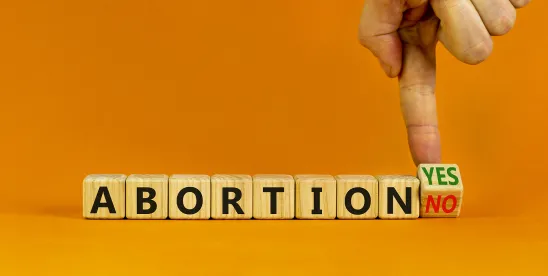In the wake of the Dobbs decision, which eliminated the constitutional right to abortion, individual states were left to regulate or ban the procedure.
A patchwork of state laws subsequently followed, with some states enacting total bans and others permitting abortion access, with considerable variations in between. In addition to regulating or restricting access to the procedure, certain states have criminalized seeking, providing, and helping others obtain or provide abortion, especially those providing telehealth services, but these actions are legal and protected in New York. New York’s “Shield Law” consists of several statutes, enacted and intended to protect providers and patients offering or seeking abortion in New York against the imposition of criminal and civil liability originating from outside the state. According to the New York State Office of the Attorney General, “[t]he Shield Law broadly prohibits law enforcement and other state officials from cooperating with investigations into reproductive health care (“protected health care”) so long as the care was lawfully provided in New York.”[1] Moreover, “[w]ith respect to reproductive health care specifically, these protections apply even if the care was provided via telehealth to a patient located out-of-state, so long as the provider was physically present in New York.”[2]
New York’s Shield Law creates substantive protections for reproductive health care, which can be summarized as follows:
- New York state and local law enforcement officers are prohibited from arresting (with or without a warrant) or extraditing anyone in connection with providing, facilitating, or receiving protected health care occurring in New York.[3] Unless the demanding state alleges in writing that the provider was physically present in that state at the time of the charged offense and fled from that state to New York, extradition requests must be denied and related warrants should not be executed.
- New York state and local law enforcement employees and entities are prohibited from cooperating with, providing information to, or using public resources in connection with investigations or proceedings relating to protected health care services lawfully provided in New York.[4] Protected information includes all state and local databases, such as from license-plate readers or health-related databases, in addition to information collected or held by state and local agencies or facilities. New York’s Shield Law does not prohibit compliance with a valid out-of-state subpoena or warrant, so long as it is not related to an effort to penalize protected health care lawfully provided in New York, nor does it prohibit providing information to the subject of the investigation. Nevertheless, any information shared must not reveal personally identifying information related to individuals’ medical procedures without the patient’s consent, even under the law’s narrow exemptions allowing for information sharing.
- Evidence related to protected health care services lawfully provided in New York that can be compelled by or admitted in state courts is limited by the Shield Act, impacting both civil and criminal proceedings, and covering subpoenas for deposition testimony, production of evidence, and/or inspection of premises.[5] When evidence related to reproductive health care is used to allege that the individual providing health care engaged in wrongdoing because the person receiving the care was not located in New York, such evidence is inadmissible in both civil and criminal proceedings.[6] Further, without a warrant, law enforcement agencies and officers are prohibited from purchasing or obtaining electronic data that would reveal information about an individual’s personally identifiable health information.[7]
New York’s Shield Law was recently invoked to protect a New York physician, Dr. Margaret Carpenter, from Texas and Louisiana civil and criminal liability. In December 2024, Texas Attorney General Ken Paxton filed a civil action against Dr. Carpenter alleging that she violated Texas law by prescribing and mailing abortion-inducing drugs to a Texas resident via telehealth without holding a medical license from Texas.[8] In February 2025, a Texas judge issued a default judgment against Dr. Carpenter for her failure to appear in court or respond to the complaint. She was ordered to pay a $100,000 civil penalty and permanently enjoined from prescribing abortion medication to Texas residents.[9] However, New York refused to enforce the Texas judgment punishing Dr. Carpenter, citing the state’s Shield Law as protection from out-of-state legal actions related to abortion services.
In January 2025, Dr. Carpenter was indicted by a grand jury in Louisiana on felony charges for allegedly prescribing abortion medication to a pregnant minor in Louisiana via telehealth. The charges against her included criminal abortion by means of abortion-inducing drugs. Louisiana issued an arrest warrant and requested extradition from New York.[10] Governor Kathy Hochul refused the extradition request invoking the state’s Shield Law protection.[11]
Other states have similar Shield Laws to New York, including California, Colorado, Maine, Massachusetts, Rhode Island, Vermont, and Washington. As such, we could see these states protect their providers from civil and criminal litigation in the same manner as New York. These laws are increasingly being challenged by anti-abortion advocates, who argue that shield laws interfere with other states’ legislative authority, shaking up the plight of interstate legal conflicts over reproductive rights.
ENDNOTES
[1] Office of the New York State Attorney General. “Shield Law Protections.” (accessed June 2025)
[2] Id.
[3] N.Y. Crim. Proc. Law §§ 570.17, 570.19, 140.10(3-a), (3-b)
[4] N.Y. Exec. Law § 837-x
[5] N.Y. Crim. Proc. Law §§ 3102, 3119
[6] N.Y. Crim. Proc. Law § 4550
[7] N.Y. Gen. Bus. Law § 394-h
[8] State of Texas v. Margaret Daley Carpenter, M.D. a/k/a Maggie Carpenter, M.D., Petition and Application for Temporary and Permanent Injunctive Relief, Cause No. 471-08943-2024 (Nov. 19, 2024).
[9] State of Texas v. Margaret Daley Carpenter, M.D. a/k/a Maggie Carpenter, M.D., Final Judgment and Order Granting Permanent Injunction, Cause No. 471-08943-2024 (Feb. 13, 2025).
[10] Office of the Governor of the State of Louisiana. “Governor Jeff Landry Signs Extradition Warrant for New York Doctor.” (Feb. 2025)
[11] New York State Office of Governor Kathy Hochul. “Video, Audio, Photos & Rush Transcript: Protecting Reproductive Freedom: Governor Hochul Signs Legislation Affirming New York’s Status as a Safe Haven for Reproductive Health Care.” (Feb. 2025)





 />i
/>i
